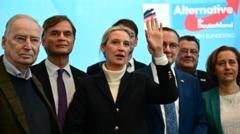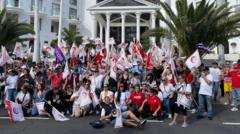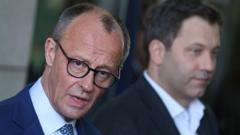The recent elections have positioned the AfD as a significant force in German politics, sparking debates over the viability of the long-standing political "firewall" that has historically excluded far-right parties from power-sharing arrangements, amidst fears of eroding democracy.
The Future of Germany's Political Firewall: Navigating AfD's Historic Success

The Future of Germany's Political Firewall: Navigating AfD's Historic Success
As the Alternative for Germany (AfD) rises in political power, the future of the longstanding consensus against collaborating with far-right parties faces scrutiny.
The political landscape in Germany is shifting dramatically following the Alternative for Germany (AfD)'s record performance in Sunday’s elections, where they garnered over 20% of the vote, making them the second-largest party in the Bundestag. This surge has reignited discussions about the so-called "firewall"—a consensus established after World War II aimed at preventing far-right factions from gaining political legitimacy.
AfD joint leader Tino Chrupalla criticized the firewall, suggesting that those who maintain such barriers will ultimately suffer consequences. In response, the established parties, including the Conservatives and Social Democrats, remain resolute in their opposition to any alliance with the AfD, who are increasingly viewed as a threat to the democratic fabric of the country. A survey revealed that 69% of voters perceive the AfD negatively regarding its impact on democracy.
The AfD’s rise can be attributed to several socio-political factors, including escalating concerns over immigration and security, as highlighted by newly-elected conservative leader Friedrich Merz. He emphasized the necessity to address these issues to undermine support for the AfD, whose vote share doubled largely due to discontentment with traditional parties’ handling of these topics.
Dominance of the AfD is particularly pronounced in eastern German states, where they won over 34% in some regions, leading Chrupalla to assert that Eastern Germans no longer want the firewall in place. This assertion is corroborated by grassroots sentiments, where some AfD voters express frustration over being ostracized. Influencers and local officials are starting to call for the party's integration into political dialogue, arguing that collaboration is crucial for addressing local issues, irrespective of partisan alignment.
Market analysts and political scientists are warning that failure to engage with AfD's electorate could normalize their radical ideologies further, with some political figures suggesting that without constructive engagement, the AfD could enhance their support base dramatically in upcoming elections. Discussions among local leaders emphasize a need to differentiate between extreme elements of the AfD and its broader voter base, many of whom view themselves as championing legitimate concerns.
Despite the calls for reconsideration, national party leaders, including those from the CDU, continue to adhere to the principle of excluding the AfD from collaboration due to their controversial positions on NATO, the European Union, and perceived extremism. The general secretary of Merz’s party firmly rejected any prospect of working with groups opposing Germany’s traditional alliances, insisting on the need to preserve what they view as the foundational integrity of German democracy.
With future elections looming, the challenge remains how to navigate the AfD's growing influence and address the legitimate concerns of its voters without compromising democratic values. Political experts predict that the greatest threats to the firewall may arise at the state level, where coalition necessities could force traditional parties to reconsider their strict barriers against collaboration.


















